(最终稿)从芭芭拉____史密斯的黑人女性主义批评视角看《宠儿》的弑婴母题
《挣脱双重桎梏,重建精彩人生—后殖民女性主义解读《宠儿》》范文

《挣脱双重桎梏,重建精彩人生—后殖民女性主义解读《宠儿》》篇一一、引言托妮·莫里森的《宠儿》是一部深入探讨美国南方种族与性别压迫的经典作品。
这部小说以独特的后殖民女性主义视角,揭示了黑人女性在历史与现实中的挣扎与抗争。
本文旨在运用后殖民女性主义理论,对《宠儿》进行深入解读,探讨主人公如何挣脱双重桎梏,重建精彩人生。
二、双重桎梏:种族与性别的压迫在《宠儿》中,主人公塞丝所面临的双重桎梏主要表现在种族与性别的压迫上。
作为黑人女性,她在白人至上的社会中饱受歧视与压迫。
在种族问题上,黑人被剥夺了尊严与权利,被视为低人一等。
在性别问题上,女性则长期处于从属地位,缺乏自主权与话语权。
塞丝所面临的正是这种种族与性别双重压迫的困境。
三、后殖民女性主义的解读后殖民女性主义理论认为,种族与性别的压迫是相互交织、相互影响的。
在《宠儿》中,这种理论得到了充分体现。
塞丝在遭受白人奴隶主的压迫的同时,还要面对社会对黑人女性的刻板印象与偏见。
后殖民女性主义强调女性的主体性与自我认同,认为女性应该摆脱种族与性别的束缚,争取自身的尊严与权利。
四、挣脱桎梏,重建精彩人生面对种族与性别的双重压迫,塞丝选择了勇敢地抗争。
她通过自我救赎与帮助他人来摆脱桎梏,逐渐找回自我价值与尊严。
在小说中,塞丝的成长与变化成为了一个重要的主题。
她从最初的无奈与屈服,到后来的勇敢与坚强,最终实现了对自我的认同与重塑。
此外,她还通过与其他黑人女性的团结与合作,共同抵抗种族与性别的压迫,为黑人女性争取了更多的权利与尊严。
五、结论通过对《宠儿》的后殖民女性主义解读,我们可以看到黑人女性在历史与现实中的挣扎与抗争。
在种族与性别的双重压迫下,她们不断寻求自我救赎与自我认同。
而塞丝的成长与变化正是这种努力的体现。
她通过勇敢地抗争,逐渐摆脱了桎梏,实现了对自我的重塑与认同。
同时,她也为我们展示了黑人女性如何通过团结与合作,共同抵抗压迫,为自身争取更多的权利与尊严。
(最终稿)从芭芭拉____史密斯的黑人女性主义批评视角看《宠儿》的弑婴母题
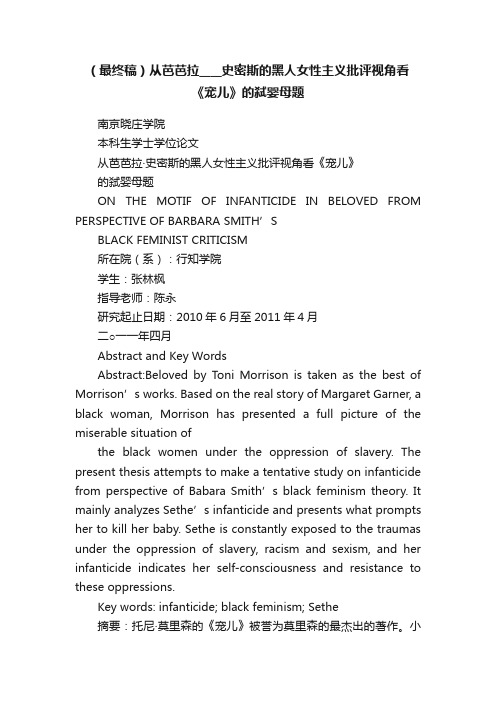
(最终稿)从芭芭拉____史密斯的黑人女性主义批评视角看《宠儿》的弑婴母题南京晓庄学院本科生学士学位论文从芭芭拉·史密斯的黑人女性主义批评视角看《宠儿》的弑婴母题ON THE MOTIF OF INFANTICIDE IN BELOVED FROM PERSPECTIVE OF BARBARA SMITH’SBLACK FEMINIST CRITICISM所在院(系):行知学院学生:张林枫指导老师:陈永研究起止日期:2010年6月至2011年4月二○一一年四月Abstract and Key WordsAbstract:Beloved by Toni Morrison is taken as the best of Morrison’s works. Based on the real story of Margaret Garner, a black woman, Morrison has presented a full picture of the miserable situation ofthe black women under the oppression of slavery. The present thesis attempts to make a tentative study on infanticide from perspective of Babara Smith’s black feminism theory. It mainly analyzes Sethe’s infanticide and presents what prompts her to kill her baby. Sethe is constantly exposed to the traumas under the oppression of slavery, racism and sexism, and her infanticide indicates her self-consciousness and resistance to these oppressions.Key words: infanticide; black feminism; Sethe摘要:托尼·莫里森的《宠儿》被誉为莫里森的最杰出的著作。
英美文化论文:浅论《宠儿》中美国黑人女性独立人格的价值分析
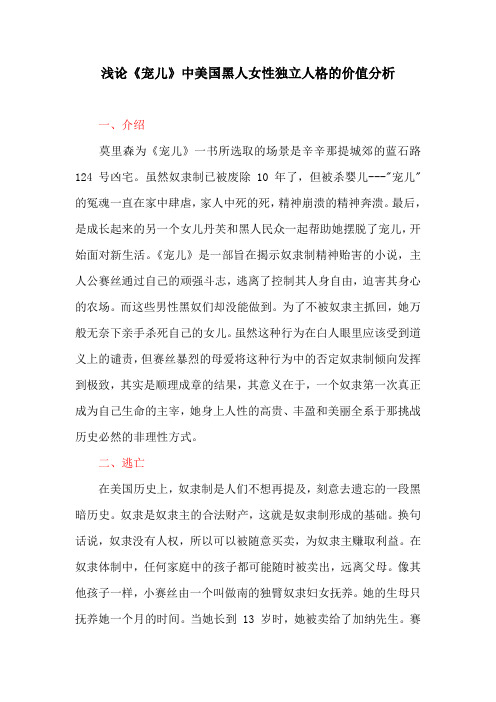
浅论《宠儿》中美国黑人女性独立人格的价值分析一、介绍莫里森为《宠儿》一书所选取的场景是辛辛那提城郊的蓝石路124 号凶宅。
虽然奴隶制已被废除 10 年了,但被杀婴儿---"宠儿"的冤魂一直在家中肆虐,家人中死的死,精神崩溃的精神奔溃。
最后,是成长起来的另一个女儿丹芙和黑人民众一起帮助她摆脱了宠儿,开始面对新生活。
《宠儿》是一部旨在揭示奴隶制精神贻害的小说,主人公赛丝通过自己的顽强斗志,逃离了控制其人身自由,迫害其身心的农场。
而这些男性黑奴们却没能做到。
为了不被奴隶主抓回,她万般无奈下亲手杀死自己的女儿。
虽然这种行为在白人眼里应该受到道义上的谴责,但赛丝暴烈的母爱将这种行为中的否定奴隶制倾向发挥到极致,其实是顺理成章的结果,其意义在于,一个奴隶第一次真正成为自己生命的主宰,她身上人性的高贵、丰盈和美丽全系于那挑战历史必然的非理性方式。
二、逃亡在美国历史上,奴隶制是人们不想再提及,刻意去遗忘的一段黑暗历史。
奴隶是奴隶主的合法财产,这就是奴隶制形成的基础。
换句话说,奴隶没有人权,所以可以被随意买卖,为奴隶主赚取利益。
在奴隶体制中,任何家庭中的孩子都可能随时被卖出,远离父母。
像其他孩子一样,小赛丝由一个叫做南的独臂奴隶妇女抚养。
她的生母只抚养她一个月的时间。
当她长到 13 岁时,她被卖给了加纳先生。
赛丝非常幸运,能在"甜蜜之家"中度过了"six years of happy marriage".加纳夫妇是最仁慈的奴隶主的典型代表。
莫里森试图唤醒奴隶,因为他们错误地认为奴隶主是仁慈的,有同情心的。
莫里森通过本书告知读者,所有奴隶主对奴隶的所作所为比起加纳夫妇对赛丝的所作所为有过之而无不及,进而揭露奴隶制的罪恶本性。
赛丝所生活的农场---"甜蜜之家",是一个半乌托邦的农场。
在奴隶制下,它不可能成为一个真正的家。
在农场的男性奴隶有权利"buy a mother, choose a horse, ora wife, handle guns, even learn reading if they wanted to". 但还是加纳夫妇的财产。
女性主义视野下的《宠儿》中的黑人女性角色浅析
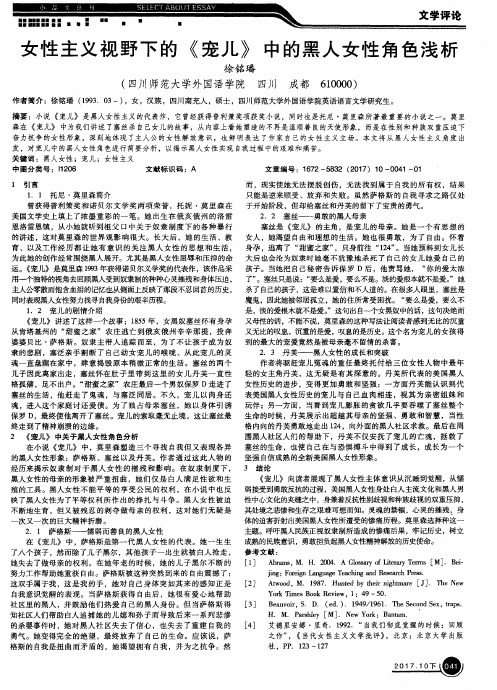
魔鬼 ,因此她被邻居孤 立 ,她 的住 所常受 困扰 。 “要 么是爱 ,要 么不
1.2 宠儿 的剧 情介 绍
是 ,淡 的爱根木就不是爱 。”这句 出自一个女黑奴中的话 ,这 句决绝而
ห้องสมุดไป่ตู้
《宠儿 》 讲述 了这 样一 个故 事 :1855年 ,女 黑 奴塞 丝怀 有身 孕 又母性的话 ,不 能不说 ,莫里森 的这种写法 让阅读者感 到无 比的沉 重
的讲 述 ,这对 莫 里 森 的世 界 观 影 响 很 大 。长 大 后 ,她 的生 活 、教 女人 ,她 渴望 自由和 理 想 的 生活 。她 也 很 勇 敢 ,为 了 自由 。怀 着
育 、以及 工作 经 历 都 让 她 有 意识 的关 注 黑 人 女 性 的 思 想 和 生 活 , 身孕 ,逃 离 了 “甜蜜之 家 ”,只身前 往 “124”。当她 预料 到 女儿 长
塞 丝 的生 活 ,他 赶 走 了 鬼 魂 ,与 塞 泛 同 居 。不 久 ,宠 儿 以 肉身 还 表 美 国黑人女 性历 史 的宠儿 与 自己血 肉相 连 ,视 其 为 亲 密姐 妹 和
魂 ,进 入这 个家 庭 讨 还 爱 债 。为 了独 占母 亲 塞 丝 ,她 以身 体 引诱 玩 伴 ;另一方 面 ,当看 到 宠 儿 膨胀 的贪 欲几 乎 要 吞 噬 了 塞丝 整 个
从 肯 塔基 州 的 “甜蜜 之 家 ” 农 庄逃 亡 到 俄 亥 俄州 辛 辛 那 提 ,投 奔 又无 比的叹息 ,沉重的是爱 ,叹息的是 历史 。这个名 为宠 儿 的女 孩得
婆婆 贝 比 ·萨 格 斯 。奴 隶 主带 人 追 踪 而 至 ,为 了 不让 孩 子 成 为 奴 到 的最 大 的宠爱竟 然 是被母 亲毫 不 留情 的杀 害 。
《宠儿》中弑婴主题和母亲身份的建构

《宠儿》中弑婴主题和母亲身份的建构摘要:美国黑人女作家托尼·莫里森的小说《宠儿》取材于一个女黑奴因不愿孩子重复自己奴隶命运而杀死孩子的真实历史事件。
塞丝的弑婴行为包含了很多因素,有出于保护的心理,也有一种无知的反抗。
当她成为母亲后,她没有如何做好母亲的信息,她只知道她能给予孩子的爱就是不让孩子重复自己的悲惨命运。
可惜她骨子里对母性的无知还是让她选择了错误的反抗方式。
这时,宠儿魂灵的出现正好填补了她想要补偿过错的心理。
小说中多处暗示这个魂灵既有宠儿的姿态,又有塞丝母亲的影子,使塞丝在身为母亲和女儿这两种角色的交织中不断消耗自己,体现出塞丝在弑婴行为前后作为母亲的种种无奈。
关键词:《宠儿》弑婴主题母亲身份引言美国黑人女作家托尼·莫里森一直致力于黑人文学的研究与创作,因此,她的小说手法及情节往往摒弃了以往白人惯用的描述黑人的成分,独具黑人的历史特色。
她获普利策小说奖的小说《宠儿》就取材于一个真实的黑人历史事件,作家在进行故事改编时亦保留了那个让人唏嘘不已的故事情节,即女主人公在被奴隶主追踪时,亲手杀死了自己的女儿。
这段情节在小说中既是故事的一个高潮点,也是小说故事前后发展的连接线。
如何看待塞丝的弑婴行为,还要放在塞丝生活的特定环境下。
本文就将以塞丝自己的母性教育为出发点,探究塞丝自己的母性来源,从而分析塞丝的弑婴行为动机。
最后,回归到母亲本性上,了解塞丝对待宠儿万般宠爱的心理因素。
1弑婴行为之影响因素分析从塞丝的独白中,读者看到的并不是一个冷血的母亲,实际上她甚至是一个愿意为孩子无条件付出的高尚的母亲形象,所以她18年前亲手杀死自己的孩子却有着错综复杂的前因后果,而并非是她人性中的凶残所致。
这当中,既有当时社会存在的奴隶制这样一个不平等的制度因素,也有塞丝成长中人为影响的因素。
1.1社会制度的背景下在奴隶制下生活的黑人们往往有很多身不由己的无奈,他们被奴隶主无情的压迫、鞭打,他们并没有为自己生活的自由。
探索黑人女性心灵世界的重构——评莫里森小说《宠儿》

文学WEN XUE2017.07《宠儿》是美国著名作家托尼·莫里森创作的一部享誉世界的作品。
莫里森以其高超的写作手法,将当时环境下黑人女性受到种族和性别歧视及心灵创伤而导致的扭曲情感表现得淋漓尽致。
莫里森详尽地描写了在社会环境的压迫下黑人女性的内心世界,将这种矛盾、渴求自由的痛苦和艰辛展现得十分透彻。
笔者从女性主义角度对莫里森《宠儿》中黑人女性的刻画展开深刻思考,分析主人公的悲惨遭遇及其受到创伤的内心世界,探索黑人女性心灵世界的重构。
一、《宠儿》的创作背景和主题思想小说《宠儿》取材于历史上一个真实故事。
1873年,在美国俄亥俄州的辛辛那提小镇,一名叫玛格丽特·加纳的女性黑奴带着儿女从位于肯塔基的奴隶庄园逃亡到此,她曾经的主人带着下属跟来抓捕她,为了不再让自己的孩子遭遇与自己相同的悲惨命运,玛格丽特·加纳在极度绝望的痛苦之下杀死了自己的女儿。
莫里森在小说中将玛格丽特·加纳化名为“塞丝”,将她夭折的女儿称为“宠儿”,以其别具一格的写作手法和对生活的敏锐观察,通过黑人文学独特的语言表达形式,使用多种写作手法还原了这个故事,向世人讲述一位美国黑人母亲悲惨的、引人深思的经历。
在这部作品中,莫里森不仅描写了母爱和对自我价值的追寻,也侧面展现出黑人在长期奴隶制度压迫下心灵发生的变化。
《宠儿》这部作品中体现出典型的女性主义思想,以黑人女性在奴隶制度迫害下为追求自由、追寻自我所做的努力,打破了黑人女性在历史中“隐形人”的静默地位。
莫里森以《宠儿》中黑人女性心灵态度的转变昭告世界,即使这段历史带来的只有痛苦和屈辱的记忆,也绝不能遗忘。
二、女性主义的呼吁和宣扬在《宠儿》中,莫里森所刻画的三位黑人女主人公正是十分典型的黑人女性。
托尼·莫里森通过对塞丝、塞丝的婆婆贝比·萨格斯和小女儿丹芙这三位黑人女性的内心描写,展现出了奴隶制度下黑人女性不断追寻自我和社会认同、努力建立属于自身的主体意识的过程。
论托妮·莫里森小说《宠儿》中的杀婴主题
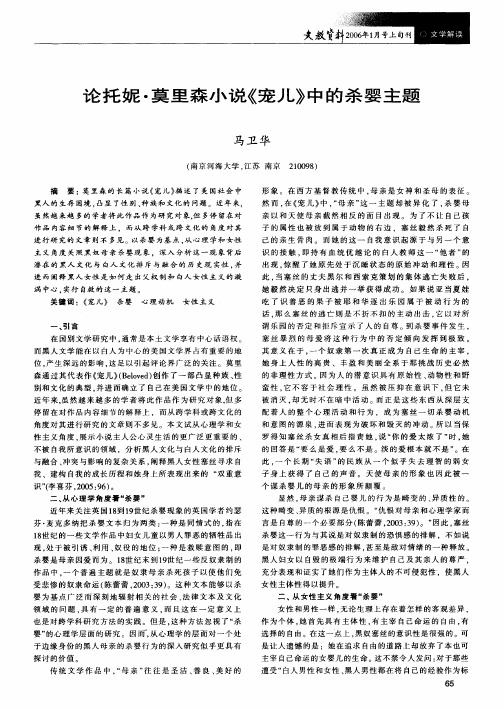
涡中心, 自 实行 救的这一主题。 关键词 : 《 宠儿》 杀婴 心理动机 女性主义
一、 引言
在国别文学研究中, 通常是本土文学享有中心话语权。 而黑人文学能在以白人为中心的美国文学界 占有重要的地 位, 产生深远的影响, 这足以引起评论界广泛的关注。莫里
森通过其代表作《 宠儿》 (Beloved)创作了一部凸显种族、 性 别和文化的典型, 并进而确立了自己在美国文学中的地位。 近年来, 虽然越来越多的学者将此作品作为研究对象, 但多
65
婴” 的心理学层面的研究。因而‘ , 从心理学的层面对一个处
于边缘身份的黑人母亲的杀婴行为的深人研究似乎更具有
探讨的价值。
传 统 文学 作 品 中 . “ 亲 ” 往 是 圣 洁 、 良、 母 往 善 美好 的
解 读 文 学苏 盐城 224002 )
摘 要 : 莫里森的长篇小说《 宠儿》 描述 了美国社会 中 黑人的生存困境, 凸显了 性别、 种族和文化的问题。近年来,
形象。在西方基督教传统中, 母亲是女神和圣母的表征。 然而 , 宠儿》 “ 在《 中,母亲” 这一主题却被异化了, 杀婴母
亲 以和天使母亲截然相反 的面 目出现。为了不让 自己孩
虽然越来越多的学者将此作品作为研究对象 但多停留在对 ,
作品内容细节的解释上,而从跨 学科或跨文化的角度时其 进行研究的文章则不多见。 以杀婴为基点, 从心理学和女性 主义角度关照黑奴母亲杀婴现象,深入分析这一现象背后 潜在的黑人文化与白人文化排斥与融合的历史现 实性 , 并
进而阐释 黑人女性是如何走 出父权制和 白人女性主义的漩
黑人妇女以自 毁的极端行为来维护自己及其亲人的尊严, 充分表现和证实了她们作为主体人的不可侵犯性,使黑人
浅析《宠儿》中黑人女性的悲剧与觉醒三稿
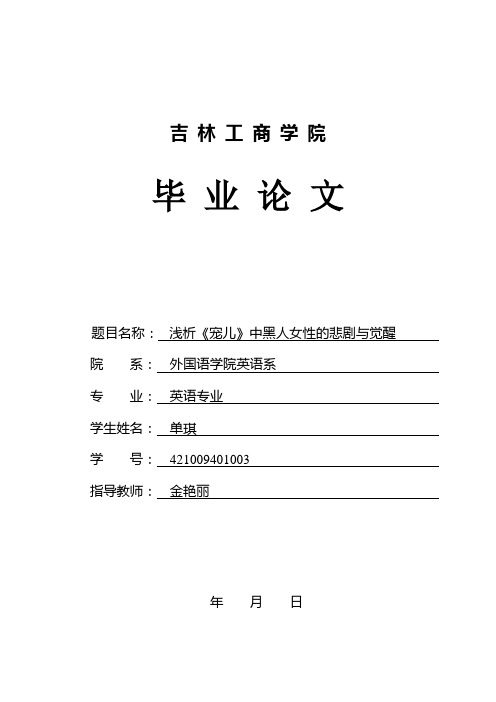
吉林工商学院毕业论文题目名称:浅析《宠儿》中黑人女性的悲剧与觉醒院系:外国语学院英语系专业:英语专业学生姓名:单琪学号:421009401003指导教师:金艳丽年月日毕业论文原创性声明本人郑重声明:所呈交毕业论文,是本人在指导教师的指导下,独立进行研究工作所取得的成果。
除文中已经注明引用的内容外,本论文不包含任何其他人或集体已经发表或撰写过的作品成果。
对本文的研究做出重要贡献的个人和集体,均已在文中以明确方式标明。
本人完全意识到本声明的法律结果由本人承担。
论文作者签名:年月日浅析《宠儿》中黑人女性的悲剧与觉醒摘要:托妮·莫里森是美国历史上唯一一位获得诺贝尔文学奖的非裔美国女性作家。
她的作品总会带有浓郁的悲剧色彩,作为黑人作家,她对种族歧视有着独到的个人见解。
《宠儿》是托妮·莫里森最震撼人心,最成熟的代表作。
本篇论文就《宠儿》中三代黑人女性不同的成长经历进行论述,充分展现了处于弱势地位的黑人妇女在种族歧视和性别主义双重压迫下的心路历程。
尽管成长的道路坎坷异常,但黑人女性们任然依靠着自己坚强的意志力和不断地努力,走出悲剧的命运,获得自我意识的觉醒。
关键字:黑人女性;种族歧视;性别主义;悲剧;觉醒Abstract:Toni Morrison is the only Afro-American women writer who wins the Nobel Prize for literature in American history. A deep sense of tragedy always immerse in her works. As a black writer, she has deep personal views on the racial discrimination. Beloved is the most vocal and mature masterpiece of Toni Morrison. This paper mainly argues that the different growing experiences of three generations of black women in Beloved, and reveals the humble position of the black women and their difficult process of the growth under the oppression of racial discrimination and sexism. Despite the path of growth is full of thorns, black women still get rid of the tragic fate and gain awakening of self-consciousness depending on their strong willpower and continuous efforts.Keywords:black women;racial discrimination;sexism;tragic;awakening目录引言 (1)一、以贝比.萨格斯为代表的第一代女黑奴的悲剧 (1)(一)黑人女性的生存苦难 (1)(二)自我意识的初步觉醒 (2)二、以赛丝为代表的第二代女黑奴的成长 (3)(一)几经波折的反抗命运 (3)(二)自我意识的不断成长 (4)三、以丹芙为代表的第三代女黑奴的抗争 (4)(一)踏上自我救赎的道路 (5)(二)摆脱不被认同的命运 (5)结语 (6)参考文献 (7)致谢 (8)引言托妮·莫里森是唯一一位获得诺贝尔文学奖的非裔女性作家,是美国历史上最有影响力的作家之一。
从女性主义视角出发分析《宠儿》的碎片叙事方法

从女性主义视角出发分析《宠儿》的碎片叙事方法作者:丁晓红来源:《昆明民族干部学院学报》2017年第04期【摘要】非裔作家莫里森的《宠儿》讲述了女主角所遭受的精神创伤问题。
本文以碎片化叙事摹仿精神创伤的内在表现与存在形式为支撑,外化为创伤的表现形式,使不可言说的创伤体验变得可以理解,旨在鼓励沉默于社会边缘地带的弱势群体发出真实的呐喊。
【关键词】美国少数族裔;女性主义;碎片叙事引言笔者选择非裔女作家莫里森的《宠儿》作为分析对象,《宠儿》讲述的是蓄奴制下的黑人母亲为避免女儿再受奴役折磨之苦,亲手弑婴的悲惨故事,作者从女性视角出发,以母题为基调,向读者描画了这位母亲不断受到精神创伤侵扰的内心世界及复杂矛盾的母女关系,通过碎片化叙事策略呼吁对于个体以及集体的创伤关注。
1.碎片化叙事方法碎片叙事相对于小说内容前后衔接而言,是作者有意而为之的陌生化文学效果。
罗西奥·戴维斯对于美国亚裔文学批评的见解值得考究,“身份政治、民族主义、种族差异和类同等方面存在着过高的关注……文学的形式和文类方面的问题却有着被忽视或被归入次要位置的倾向。
”笔者从创伤叙事策略-——碎片化叙事入手,聚焦非裔少数族裔女作家的创伤作品,通过记录真实的历史创伤事件为提升美国少数族裔文学地位奠定基础。
碎片化叙事是“不可言说之物的见证者”。
弗雷德里克·杰姆逊(Fredric Jameson)将“非连续性、碎片性”看作是“历史的本真状态。
”碎片打破整体化一的世界,消解文本的完整度,进而结构、情节都可以任由作者随意拼贴。
碎片消解文本中的潜在意义,将那些隐藏着的不可言说的事情以曲折形式公之于众。
2.叙事结构碎片化《宠儿》将故事碎片化,采用多人物视角叙事,以第三人称叙事为主,第一人称叙事为辅,多声部讲述黑奴们在蓄奴制下血雨腥风的暴力抗争生活。
闪回,延宕与重复是精神创伤的三大癔症。
闪回使受害者思绪反复亲历创伤现场,陷入惊恐之中无法自拔;延宕则使受害者无法控制闪回的反复路径;一次次的创伤重复折磨着受害者的身心,局限他们的言行。
浅析《宠儿》中弑婴的非偶然性

浅析《宠儿》中弒婴的非偶然性作者:肖颖来源:《文学教育·中旬版》2016年第01期内容摘要:本文通过介绍美国著名的黑人女作家托尼·莫里斯的长篇小说《宠儿》、主要人物塞丝的成长环境及她对孩子们深深的“爱”,来分析塞丝弒婴非偶然性的原因。
关键词:《宠儿》塞丝母爱弒婴《宠儿》以碎片和倒叙回忆的方式来展开情节。
小说中的主人翁黑奴塞丝因无法忍受“学校老师”(奴隶主的代表人物)惨无人道的折磨,不顾有孕在身从肯塔基州的奴隶农庄逃亡到该处,投奔婆婆贝比萨格斯,并在那度过了甜蜜的二十八天。
但是,好景不长,二十八天后,“学校老师”带着刽子手追来,塞丝和她孩子们宁静的生活被打破了。
为了不让自己的孩子重新回到奴隶主家做牛做马,她最终以一种残忍而变态的方式来解决问题。
在学校老师的逼迫下,塞丝毅然决定残忍的锯断了年仅一岁的女儿的喉咙,亲手杀死了自己的三女儿。
下葬时,她给女儿取名“宠儿”。
一.塞丝的成长幼年的塞丝由一位独臂女奴养育,在她支离破碎的记忆中,她的母亲喂养过他两三周的奶,但她只能吃白人孩子吃剩下的奶水。
她的母亲没日没夜的在庄园里劳作。
小时候,塞丝亲眼目睹自己的母亲造人凌辱,被买卖,最后被吊死。
塞丝长大以后,“甜蜜之家”的奴隶主加纳夫妇的较为民主的管理,使她没有意识到自己作为奴隶的事实,所以她暂时性的没有反抗苦难的奴隶生活。
并和男黑奴黑尔结婚生子继续在“甜蜜之家”做奴隶。
然而,自从“甜蜜之家”被“学校老师”接管后,她的奶水被“学校老师”的侄子抢走,这种行为剥夺了她做母亲的权利。
这些都为塞丝的逃走奠定了基础。
最后,在她悲苦的生活中慢慢意识到了,作为奴隶的她和她的家人,只有离开“甜蜜之家”,才能让她和她的孩子们结束奴隶生活。
二.塞丝的母爱《宠儿》中塞丝的原型是一位名叫玛格丽特·加纳的女黑奴带着自己的孩子们从肯塔基州的奴隶庄园逃往俄亥俄州的辛辛那提。
当奴隶主追上他们,玛格丽特·加纳用一把斧子砍死了自己的女儿。
《宠儿》中塞丝的弑婴行为研究
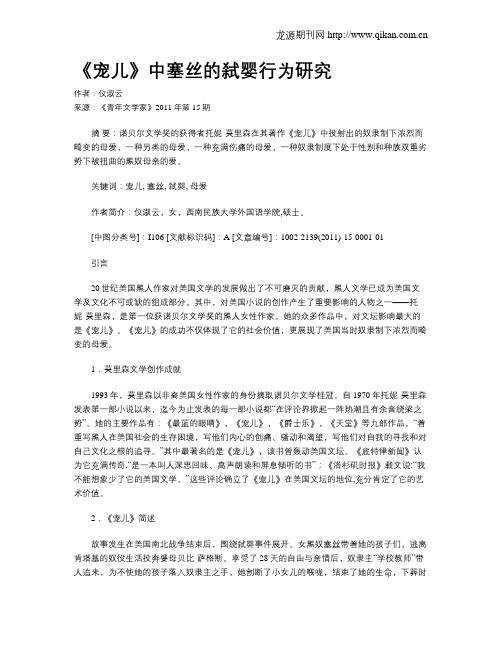
《宠儿》中塞丝的弑婴行为研究作者:仪淑云来源:《青年文学家》2011年第15期摘要:诺贝尔文学奖的获得者托妮·莫里森在其著作《宠儿》中投射出的奴隶制下浓烈而畸变的母爱,一种另类的母爱,一种充满伤痛的母爱,一种奴隶制度下处于性别和种族双重劣势下被扭曲的黑奴母亲的爱。
关键词:宠儿, 塞丝, 弑婴, 母爱作者简介:仪淑云,女,西南民族大学外国语学院,硕士。
[中图分类号]:I106 [文献标识码]:A [文章编号]:1002-2139(2011)-15-0001-01引言20世纪美国黑人作家对美国文学的发展做出了不可磨灭的贡献,黑人文学已成为美国文学及文化不可或缺的组成部分。
其中,对美国小说的创作产生了重要影响的人物之一——托妮·莫里森,是第一位获诺贝尔文学奖的黑人女性作家。
她的众多作品中,对文坛影响最大的是《宠儿》。
《宠儿》的成功不仅体现了它的社会价值,更展现了美国当时奴隶制下浓烈而畸变的母爱。
1.莫里森文学创作成就1993年,莫里森以非裔美国女性作家的身份摘取诺贝尔文学桂冠。
自1970年托妮·莫里森发表第一部小说以来,迄今为止发表的每一部小说都“在评论界掀起一阵热潮且有余音绕梁之势”。
她的主要作品有:《最蓝的眼睛》,《宠儿》,《爵士乐》,《天堂》等九部作品,“着重写黑人在美国社会的生存困境,写他们内心的创痛、骚动和渴望,写他们对自我的寻找和对自己文化之根的追寻。
”其中最著名的是《宠儿》,该书曾轰动美国文坛。
《底特律新闻》认为它充满传奇,“是一本叫人深思回味、高声朗读和屏息倾听的书”;《洛杉矶时报》载文说:“我不能想象少了它的美国文学。
”这些评论确立了《宠儿》在美国文坛的地位,充分肯定了它的艺术价值。
2.《宠儿》简述故事发生在美国南北战争结束后,围绕弑婴事件展开。
女黑奴塞丝带着她的孩子们,逃离肯塔基的奴役生活投奔婆母贝比·萨格斯。
享受了28天的自由与亲情后,奴隶主“学校教师”带人追来,为不使她的孩子落入奴隶主之手,她割断了小女儿的喉咙,结束了她的生命,下葬时取名为“宠儿”。
(英语毕业论文)浅析《宠儿》中扭曲的母爱
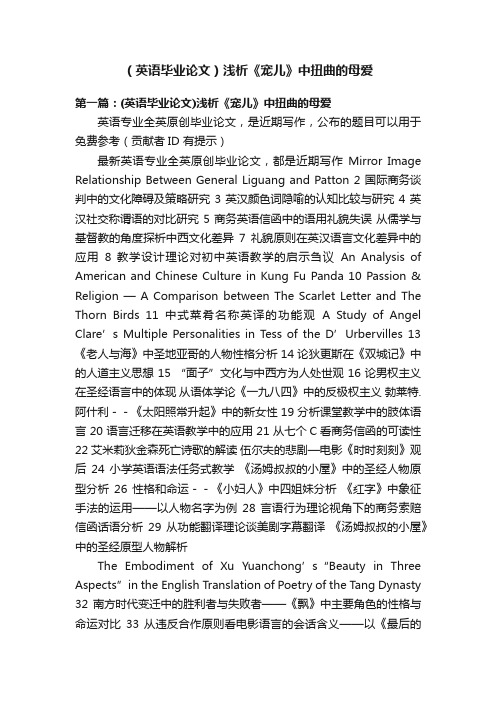
(英语毕业论文)浅析《宠儿》中扭曲的母爱第一篇:(英语毕业论文)浅析《宠儿》中扭曲的母爱英语专业全英原创毕业论文,是近期写作,公布的题目可以用于免费参考(贡献者ID 有提示)最新英语专业全英原创毕业论文,都是近期写作Mirror Image Relationship Between General Liguang and Patton 2 国际商务谈判中的文化障碍及策略研究 3 英汉颜色词隐喻的认知比较与研究 4 英汉社交称谓语的对比研究 5 商务英语信函中的语用礼貌失误从儒学与基督教的角度探析中西文化差异7 礼貌原则在英汉语言文化差异中的应用8 教学设计理论对初中英语教学的启示刍议An Analysis of American and Chinese Culture in Kung Fu Panda 10 Passion & Religion —A Comparison between The Scarlet Letter and The Thorn Birds 11 中式菜肴名称英译的功能观 A Study of Angel Clare’s Multiple Personalities in Tess of the D’Urbervilles 13 《老人与海》中圣地亚哥的人物性格分析 14 论狄更斯在《双城记》中的人道主义思想15 “面子”文化与中西方为人处世观 16 论男权主义在圣经语言中的体现从语体学论《一九八四》中的反极权主义勃莱特.阿什利--《太阳照常升起》中的新女性 19 分析课堂教学中的肢体语言 20 语言迁移在英语教学中的应用 21 从七个C看商务信函的可读性22 艾米莉狄金森死亡诗歌的解读伍尔夫的悲剧—电影《时时刻刻》观后24 小学英语语法任务式教学《汤姆叔叔的小屋》中的圣经人物原型分析26 性格和命运--《小妇人》中四姐妹分析《红字》中象征手法的运用——以人物名字为例28 言语行为理论视角下的商务索赔信函话语分析29 从功能翻译理论谈美剧字幕翻译《汤姆叔叔的小屋》中的圣经原型人物解析The Embodiment of Xu Yuanchong’s“Beauty in Three Aspe cts”in the English Translation of Poetry of the Tang Dynasty 32 南方时代变迁中的胜利者与失败者——《飘》中主要角色的性格与命运对比33 从违反合作原则看电影语言的会话含义——以《最后的武士》为例 34 从成长小说角度解读《马丁.伊登》 35 浅谈中国古词的色彩美在英语中的重现A Study on Error Correction in JEFC Classroom 37 中英道歉策略对比研究浅析托妮·莫里森《宠儿》中人物的身份建构从中西思维方式的差异看《梦》及其英译本中主语的确定从引进好莱坞大片看中国意识形态转型: 从集体主义到个人主义(开题报告+论)41 如何运用情景教学法进行初中英语词汇教学的探讨英语专业全英原创毕业论文,是近期写作,公布的题目可以用于免费参考(贡献者ID 有提示)“土生子”叛逆精神探源英汉称呼语的对比研究英汉习语对比研究及其对高中英语教学的启示论原声电影对提高大学生英语听说能力的作用An Analysis of the Character of Scarlett in Gone With the Wind 英文商业广告的语言特点英语影视的课堂价值The Elementary Stage Translation Teaching Design for Undergraduate English Majors 美国影视剧中的俚语翻译美国梦的开始与破灭—试析菲茨杰拉德的《夜色温柔》从接受美学视角看中式菜肴的英译合作学习在英语口语教学中的应用从中西文化差异对英语口语教学的探讨从“龙”一词的文化内涵看汉英文化的差异《蝴蝶梦》中女主角吕蓓卡的人物形象分析论高中英语写作教学中的文化意识培养How t o Arouse the Students’Interests in English Learning 对《最蓝的眼睛》黑人的悲剧命运的分析对比研究中西家庭观On Michael Moore's Fahrenheit / From the Rhetoric Perspective Nonverbal Communication Used in Different English Teaching Stages 中西饮食文化及其差异探析《愤怒的葡萄》中人性的力量《最蓝的眼睛》的叙述声音和视角大学英语与高中英语教学的过渡与衔接The Artistic Value ofThe Call of the Wild 从“礼貌原则”看中国学习者在跨文化交际中的语用失误——以“please”为例伊丽莎白.班内特和姚木兰的比较研究从目的论的角度谈商标翻译的原则及技巧中英颜色词的比较浅析目的论下宣传标语的英译失误论《傲骨贤妻》字幕翻译中的归化和异化策略从《野性的呼唤》看杰克伦敦自然主义观How to Make Students Participate in Class Activities Actively 从生态女性主义角度解读《苔丝》跨文化背景下的广告翻译技巧商务英语合同的翻译特点及策略研究英汉颜色词隐喻的认知比较与研究论不可译到可译的历史性变化爱伦坡短片小说“美女之死”主题研究《永别了,武器》一书所体现的海明威的写作风格英文电影名汉译中的功能对等英汉典故及文化内涵的比较分析英语专业全英原创毕业论文,是近期写作,公布的题目可以用于免费参考(贡献者ID 有提示)试析英汉颜色习语折射出的中西文化异同 87 凯瑟琳曼斯菲尔德小说中的旅行主题分析 88 国际商务合同的用词特点及翻译 89 论中英情感隐喻的异同点The Racial Stereotypes in American TV Media 91 会话含义在商务谈判中的运用The Darkness in Oscar Wilde’s Fairy TalesAn Analysis of American and Chinese Culture in Kung Fu Panda 94 英语中源于希腊罗马神话主要神祇姓名词汇的认知探索95 论《兔子, 跑吧》中哈利的逃避主义论《看不见的人》的主人公的心理成长历程 97 国际商务函电的礼貌原则研究 98 商标翻译及商标翻译中的文化禁忌 99 论中美日常交际的文化差异 100 论译文质量保证的途径 101 浅谈英语广告的特点及翻译Tradition and Beyond—Reading The Diviners as a Bildungsroman 103 浅析“Warming-up”在初中英语学习中的功能104 从唯美主义角度分析《莎乐美》中邪恶的灵魂 105 哈代的女性观在苔丝中的反映 106 中英文称谓语的比较与翻译 107 人名名词词汇化问题从文化视角看中美家庭教育差异查尔斯.达尔内——《双城记》中一个内心充满矛盾的人物“家有儿女”VS“成长的烦恼”——对比研究中西方家庭教育111 The Influences of the Bible on Some American Movies 112 BBC对华态度变化趋势:扫视年BBC有关中国的若干重要报道 113 房间和风景的象征意义:读福斯特的《看得见风景的房间》The Application of Cohesive Devices in Chinese-English Translation of Chinese Literary Works 115 小说《飘》中斯嘉丽的人物性格分析从性别歧视浅析两位复仇女性之困境——美狄亚及莎乐美从《大卫科波菲尔》的女性人物塑造看现实主义与浪漫主义的结合 118美国牛仔和牛仔文化Living in the Crack: A Study of the Grotesques in Winesburg, Ohio 121 商标翻译的本土化研究从“米兰达”的人物形象看凯瑟琳安波特的女性观123 话语标记词在中英戏剧翻译中的作用与运用General Principles and Features of Legal English Translation 125 输出理论在大学英语教学中的应用现代人对超人的需求--超人形象演变综述127 试析《珍妮姑娘》中女主人公的悲剧根源 128 中西文化中颜色词的象征意义英语专业全英原创毕业论文,是近期写作,公布的题目可以用于免费参考(贡献者ID 有提示)中西社交礼仪的比较与融合《瓦尔登湖》中寂寞观的超验主义分析 131 浅析《简.爱》的主人公简.爱论功能对等理论视角下的英文化妆品说明书翻译133 谈归化与异化翻译的融合--以谚语翻译为例《夜莺与玫瑰》和《快乐王子》中奥斯卡.王尔德的唯美主义135 Metaphors in the Themes of Of Mice and Men 136 How to Arouse the Students’Interests in English Learning 137 语法翻译法与交际法的对比研究对当今中国大学英语作为第二外语的教学方法的观察和思考139 《人鼠之间》中两主人公乔治和雷尼的对比分析140 从中西文化差异看英汉数字翻译从《简.爱》的多译本看中国两性关系的变化 142 科技英语的特点和翻译技巧《远离尘嚣》中女主角的情感变迁研究144 模糊限制语的语用功能及在广告中的应用An Analysis of Harriet Beecher Stowe’s View on Christianity in Uncle T om’s Cabin 146 A Study of AP’s News Reports from the Angle of Cooperative Principle 147 简爱和林黛玉的反叛性格对比分析《杀死一只知更鸟》中主人公的成长危机149 塞林格《麦田里的守望者》的逃离与守望An Analysis of the Religious Elements in Robinson Crusoe 151 爱伦坡的分析方法在“厄舍屋的倒塌”中的应用 152 论环境和社会制度对人的行为和品格的影响——以《雾都孤儿》中南希的形象分析为例 153 On Romanticism in Ode to the West Wind 154 分析法律英语的特点155 《老人与海》中的象征主义156 《鲁滨逊漂流记》中‘星期五’的意义 157 欧美电影对英语学习者英语口语的影响 158 On Loss of Fidelity in Translation 159 中英文化差异与英语教学 160 英汉委婉语跨文化对比研究161 论电影翻译中的创造性叛逆——以《肖申克的救赎》为例162 A Brief Study of the Causes of Emily’s Tragedy in A Rose for Emily 163 浅析汉英动物词的文化内涵及其翻译 164 张爱玲与简奥斯汀的讽刺艺术比较 165 语用预设视野下的广告英语分析166 从目的论的角度谈商标翻译的原则及技巧167 On the Aesthetic Connotation of the Death in For Whom the Bell Tolls by Hemingway 168 从《红楼梦》和《简爱》看中西方女性主义169 The Application of Cooperative Learning in Senior High School English Writing Class 170 中英色彩词的文化内涵异同分析171 解读《喜福会》中吴夙愿与吴精美母女之间被误解的爱172 Differences Between English and Chinese Euphemisms and Influences on Cross-cultural 英语专业全英原创毕业论文,是近期写作,公布的题目可以用于免费参考(贡献者ID 有提示)Communication 173 灵魂的真实——《达洛卫夫人》意识流剖析 174 跨文化交际中的禁忌习俗175 英语基本味觉词“甜/苦”的隐喻机制 176 对中英语“丑”词的文化和认知解读177 Sense and Sensibili ty in Jane Austen’s Persuasion178 从中美非语言差异看国际商务谈判的影响及其对策179 The Problem of Evil---A Universal Issue Seen From Western Perspectives 180 浅析电视口译的特点及其译文质量评价181 论《傲骨贤妻》字幕翻译中的归化和异化策略 182 英语科技文献的句子特点与翻译183 从目的论角度讨论英语电影片名的翻译184 On Carl’s Personality in Titanic185 从关联理论的角度看英语广告中隐喻的翻译 186 《飘》中郝思嘉是现代女性的楷模 187 解读《皆大欢喜》中的浪漫主义188 图式理论在高中英语阅读教学中的应用 189 欧亨利《最后一片叶子》解读190 The Pursuit and Disillusionment of the American Dream—On Martin Eden 191 Advertisement translation from the Perspective of Nida’s Functional Equiva lence Theory 192 英语专业本科毕业论文摘要的体裁分析193 文化差异对中美商务谈判的影响194 《坎特伯雷故事集》的现实主义特征 195 英汉习语中的文化差异及翻译研究 196 中西餐桌礼仪文化差异197 汽车广告英语的语言特点及其翻译198 浅析小说《傲慢与偏见》中爱情和婚姻的关系 199 探讨英语翻译教学中的问题及改进200 从《认真的重要性》中的布雷克耐尔夫人看维多利亚时代贵族女性特点第二篇:毕业论文中英语短片主题:翻译1、MAN MARINE DIESEL ENGINE MANThe latest large bore two storke MAN, engine is the KSZ 90/163B series in cylinder number from 6 to 12 and developing2,700kW(3,672HP)/cyl.The engine operates at 122r/min, with an M.E.P of 13bar and a mean piston speed of 6.5m/s.The bedplate is of fabricated design and consists of weo I-shaped longitudinal girders with transverse menbers into which the cast steel bearing housings are welded.The thrust bearing casting is incorporated into the bedplate.Columns have been replaced by frames constructed of box shaped longitudinal girders.Thew fabricated top and bottom sections run the full length of the engine and are mounted on the bedplate.Such an engine frame helps to stiffen the engine and so protect the bearings from the deformation forces transmitted via the ship's double bottom.The cast iron guideways for the crosshead are attached to the top section and seal off the crankcase.The cylinder jackets are individual castings bolted together to form onecontinuous member.The one piece cylinder liners are fitted into the jackets from the top and a cast steel strong back is fittedin way of the combustion space to help absorb gas forces.The scavenge process is the MAN loop system and the scavenge and wxhaust ports are arranged in two tiers and are carried far around the liner.The vertical lands between the ports are cooled by water passing hrough cast in tubes and hence to passages arranged around the liner above the exhaust ports.Each cylinder cover is in two parts, the lower section is of special thin walled forged steel permitting the area in way of the combustion gases to be intensively cooled whilst absorbing thermal stresses and this is held in position by an upper supporting unit of cast iron, which transmits the gas forces to the cylinder jackets via long studs.The joint face between the cylinder cover and the liner is arranged as far from the combustion process as possible.The gas loads on the engine structure are constrained by means of hydraulic preloaded tie rods which connect the bedplate, frame sections and cylinder jackets into a single unit.The crankshaft is of the semi-built tybe, with the journal being shrunk into the forged or cast steel crank throws.With the exception of the six-cylinder engine, it is in two arts joined by fitted bolts.The coupling flange for attachment to the propeller shaft also accommodates the turning gear and is integrally forged with the crankshaft.The aft end section also incorporates a thrust collar.The drive for the camshaft gear train is taken from a spur gear which for a six cylinder engine is the couping end and for 7 to 12 sylinder engines the drive is located in the middleof the engine.The piston crown is of forged steel and is designed for intensive cooling;the central supporting body is of cast steel and is mainly suvjected to compressive stress.The two components are bolted together and connected to the piston rod.A single piece piston skirt fitted with bronze rings guides thepiston in the cylinder liner.The piston ring grooves for a standard engine are flame hardened against wear.The crosshead pin bearings are whte metal lined shells lubricated by means of highpressure pumps.The piston forces are transmitted over the entire length of the crosshead pin then to the connecting rod via the lower half single bearing shell.The principle of hydrostatic lubrication has been applied to the crosshead using high-pressure lubricators.This is achieved by means of high pressure rod,high pressure oil is delivered to the ower part of the crosshead bearing, the pumps press oil film is maintained at all times and on all loads between the journal and the shell.Scavenging of the cylinder liner is on the loop scavenge system and constant pressure of the exhaust gas is used to drive the turbochargers.During running up and in the lower partial load range the turbochargers are assisted by electrically driven auxiliary blowers connected before the compressors of the main blowers.In the upper power range the auxiliary blowers are disconnected.Diffusers are fitted in the exhaust system and facilitate charge removal and scavenging in each cylinder.The diffuser also prevents pressure pulses from one cylinder interfering with another during operation.2、MAN-B&W MC ENGINE MAN-B&W MCMAN-B&W K90 MC-C engine is a large crosshead tybe two-stroke engine with a broe of 900mm, a 2,300mm stroke and an operating speed of 104r/min.It is constructed with between six and twelve cylinders.Developed as one of the extensive range of the manufacturer's MC engines, it is of the power and speed best suited to large, fast container ships.The increase in running speed is obtained by a slight decrease in engine stroke.High thermal efficiency is maintained by an increase in mean effectivepressure(M.E.P.).Construction can be considered generally as typical for the whole range.The engine bedplate is of rigid box form, fabricated from steel plates with main bearing supports of cast steel.Welded 'A' frames are assembled into a frame box which contains the crankcase, the crosshead guides and also supports the wheels for the chain drive of the camshaft.A cast iron cylinder frame accommodates the scavenge space between the cylinder jacket and the diaphragm, both of which are water-cooled.Long pre-stressed tie bolts are fitted between the top of the frame and the underside of the bedplate girders.The cylinder liner is of alloy cast iron, its upper flange lands on top of the frame and has bore cooling.It is secured by a forged steel cylinder cover which is also bore cooled and is shaped internally to accommodate most of the combustion space.Cylinder luvricating oil is injected at one level in the liner.Pistons have a chrome-molybdenum alloy steel crown with hard chrome-surfaced ring grooves in which four compression rings are fitted.In this particular model a protective layer of Inconel is welded to part of the crown surface to prevent high temperature corrosion.The piston is oil cooled, oil being supplied by a telescopic gland to the crosshead and then through the piston rod.It is returned from the crosshead to a slotted pipe in the crankcase.A short cast iron skirt is added.The crown is bolted to the piston rod at an inner support ring.Surface hardening reduces wear on the piston rod at the diaphragm gland.The rod is bolted ata the top of a cylindrical crosshead which is of large diameter and incorporates a full-length bottom half-bearing shell.Floating guide shoes are attached at each end.The crankshaft may be either semi-built up or of welded construcion, with large journals and pins.All crankcase hearings are of white metal.Main bearings have thickshells, crankpin(bottom end)and crosshead(top end)bearing have thin-wall shells.White metal is used for the guide surfaces.The exhaust valves are operated hydraulically under oil pressure from cam-timed actuated pistons.They have air compressed springs which allows them to be rotated by vanes.The valve spindles are usually manufactured by the hot isostatic pressure(HIP)method, a compound Nimonic and austenitic steel part construction.Valve housing is cooling at its seat and spindle guide bush but its upper duct is uncooled to avoid low temperature corrosion.Fuel pumps are cam driven and timed by the plunger helix.An adjustable barrel allows variable ignition timing to maintain combustion efficiency at low speed and can be adjusted to match the ignition quality of fuels.Pump timing is changed for astern operation by a link connected at the cam roller guide which is activated by compressed air.Each pump supplies three identical fuel injectors for thecorresponding unit.Injectors are uncooled but they circulate hot fuel oil directly white their needle valves are in the closed position.The engine operates with a constant pressure system, with uncooled turbochargers.Two auxiliary blowers are fitted to operate at low charge air pressure or at lowengine revolutions.A number of waste heat recovery and power take-off systems can be operated under running conditions.第三篇:英语毕业论文中国式英语初探中国英语初探[摘要]随着中国政治经济的发展,中国英语也日益形成。
《宠儿》之女性主义解读
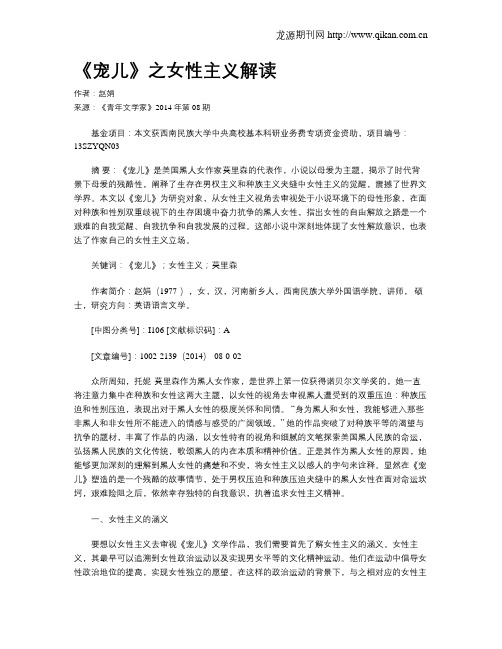
《宠儿》之女性主义解读作者:赵娟来源:《青年文学家》2014年第08期基金项目:本文获西南民族大学中央高校基本科研业务费专项资金资助,项目编号:13SZYQN03摘要:《宠儿》是美国黑人女作家莫里森的代表作,小说以母爱为主题,揭示了时代背景下母爱的残酷性,阐释了生存在男权主义和种族主义夹缝中女性主义的觉醒,震撼了世界文学界。
本文以《宠儿》为研究对象,从女性主义视角去审视处于小说环境下的母性形象,在面对种族和性别双重歧视下的生存困境中奋力抗争的黑人女性,指出女性的自由解放之路是一个艰难的自我觉醒、自我抗争和自我发展的过程。
这部小说中深刻地体现了女性解放意识,也表达了作家自己的女性主义立场。
关键词:《宠儿》;女性主义;莫里森作者简介:赵娟(1977-),女,汉,河南新乡人,西南民族大学外国语学院,讲师,硕士,研究方向:英语语言文学。
[中图分类号]:I106 [文献标识码]:A[文章编号]:1002-2139(2014)-08-0-02众所周知,托妮·莫里森作为黑人女作家,是世界上第一位获得诺贝尔文学奖的,她一直将注意力集中在种族和女性这两大主题,以女性的视角去审视黑人遭受到的双重压迫:种族压迫和性别压迫,表现出对于黑人女性的极度关怀和同情。
“身为黑人和女性,我能够进入那些非黑人和非女性所不能进入的情感与感受的广阔领域。
” 她的作品突破了对种族平等的渴望与抗争的题材,丰富了作品的内涵,以女性特有的视角和细腻的文笔探索美国黑人民族的命运,弘扬黑人民族的文化传统,歌颂黑人的内在本质和精神价值。
正是其作为黑人女性的原因,她能够更加深刻的理解到黑人女性的痛楚和不安,将女性主义以感人的字句来诠释。
显然在《宠儿》塑造的是一个残酷的故事情节,处于男权压迫和种族压迫夹缝中的黑人女性在面对命运坎坷,艰难险阻之后,依然幸存独特的自我意识,执着追求女性主义精神。
一、女性主义的涵义要想以女性主义去审视《宠儿》文学作品,我们需要首先了解女性主义的涵义。
论《宠儿》中黑人女性的心理创伤和修复

标题:走出创伤的阴霾——黑人女性主体性的构建
在这部小说中,主人公通过自我疗愈和自我救赎的过程,逐渐认识到自己的 价值和力量。她开始自己的内心世界,开始对抗社会的偏见和歧视,开始为自己 的权益而奋斗。这种自我赋能的过程,正是黑人女性构建主体性的重要方式。
标题:走出创伤的阴霾——黑人女性主体性的构建
总之,《宠儿》是一部深刻揭示母爱与女性的复杂性和多样性的小说。莫里 森通过刻画赛拉这个复杂而多面的女性形象,以及运用哥特式的手法,使得读者 对母爱和女性有了更加深刻的理解和认识。这部小说无疑是对母爱和女性的深刻 剖析和赞美,
《宠儿》是托妮·莫里森的代表作,这部小说从不同的角度和层次展示了母 爱与女性的复杂性和多样性。本次演示将从女性哥特的角度对《宠儿》中的母爱 与女性进行深入剖析。
基本内容
首先,莫里森在《宠儿》中刻画的女性形象是复杂而多面的。母亲赛拉是一 个典型的例子。她是一个黑人女性,面对残酷的现实和悲惨的命运,她始终坚守 着母爱的伟大和无私。然而,她也有着阴暗的一面,亲手掐死自己的女儿这种行 为无疑是对母爱
基本内容
在现代社会中,心理创伤仍然是一个普遍存在的问题,尤其是在经历过历史 或现实不公正待遇的人群中。因此,我们需要从《宠儿》这部小说中汲取灵感和 力量,并解决心理创伤问题。具体而言,我们可以通过以下途径来促进心理创伤 的修复:
基本内容
1、提供专业的心理咨询和治疗:建立完善的心理咨询和治疗体系,为受到心 理创伤的人提供专业的支持和帮助。心理咨询师可以通过心理辅导、认知行为疗 法等方式帮助个体克服创伤,重新建立自信和生活目标。
基本内容
2、推动社会公平与正义:从社会层面出发,推动公平与正义的落实是减少心 理创伤的根本途径。减少歧视、提高弱势群体的权益地位、推进历史遗留问题的 解决等措施都有助于增强社会的包容性和稳定性。
宠儿 论文

摘要《宠儿》是托妮·莫里森最震撼人心,最成熟的代表作,这部作品聚焦了美国历史与黑人女性,从莫里森自己独特的角度成功地描绘了奴隶制的残酷和黑人女性自我寻找的心路历程。
小说更是充分展现了女主人公塞丝在奴隶制影响下从迷失自我到自我意识觉醒、探索直至成功构建主体的自我寻找之路,同时莫里森在这部小说中达到了记住过去与忘却过去的和谐统一,指出了团结互助是黑人民族得以生存和强大的关键。
关键词:托妮·莫里森;黑人女性;《宠儿》;塞丝;自我寻找AbstractBeloved is Toni's most representative work which excite people's mind.This work focused on American history and black women, Toni's own unique perspective and the feminist ideas successfully portrayed the mentality of self seeking and the cruelty of slavery.The novel demonstrates respectively Seth suffering to resist until her self-awareness built. At the same time,Morrison in the novel produce harmony of remember the past and forget the past,she stresses the cooperation is the key to survival for black people.Key words : Toni Morrison; black woman; Beloved;Seth ;self - atonement目录一、引言 (1)二、主体的缺失(一)父母之爱的缺席 (1)(二)白人文化的侵蚀 (2)(三)男性的压迫 (3)三、主体的建立(一)内在因素 (4)1.塞丝自我意识的觉醒与探索 (4)2.被动向主动的转变 (5)(二)外在因素 (6)1.民族文化的影响 (7)2.他人的帮助 (7)四、结语 (8)注释 (9)参考文献 (10)附录1文献综述 (11)致谢 (16)引言《宠儿》是托妮·莫里森最震撼人心,最成熟的代表作,现已成为当代文学史上不朽的经典,也是美国文学史上最畅销的作品之一。
影片《宠儿》中的黑人女性主义透视
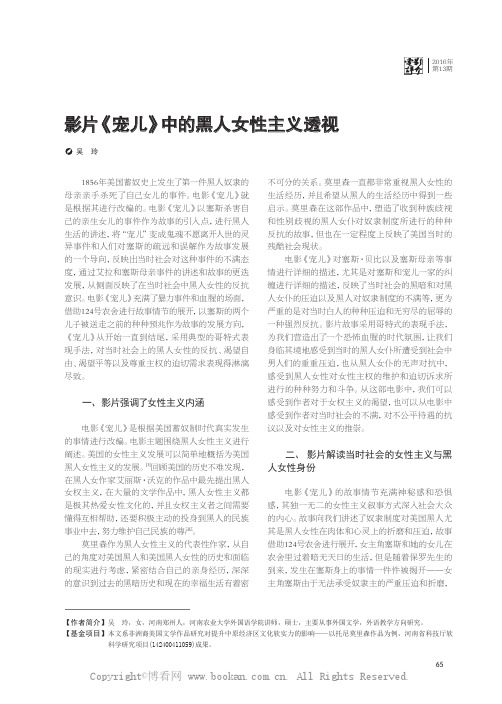
2016年第13期1856年美国蓄奴史上发生了第一件黑人奴隶的母亲亲手杀死了自己女儿的事件。
电影《宠儿》就是根据其进行改编的。
电影《宠儿》以塞斯杀害自己的亲生女儿的事件作为故事的引入点,进行黑人生活的讲述,将“宠儿”变成鬼魂不愿离开人世的灵异事件和人们对塞斯的疏远和误解作为故事发展的一个导向,反映出当时社会对这种事件的不满态度,通过艾拉和塞斯母亲事件的讲述和故事的更迭发展,从侧面反映了在当时社会中黑人女性的反抗意识。
电影《宠儿》充满了暴力事件和血腥的场面,借助124号农舍进行故事情节的展开,以塞斯的两个儿子被送走之前的种种预兆作为故事的发展方向,《宠儿》从开始一直到结尾,采用典型的哥特式表现手法,对当时社会上的黑人女性的反抗、渴望自由、渴望平等以及尊重主权的迫切需求表现得淋漓尽致。
一、 影片强调了女性主义内涵电影《宠儿》是根据美国蓄奴制时代真实发生的事情进行改编。
电影主题围绕黑人女性主义进行阐述。
美国的女性主义发展可以简单地概括为美国黑人女性主义的发展。
[1]回顾美国的历史不难发现,在黑人女作家艾丽斯·沃克的作品中最先提出黑人女权主义,在大量的文学作品中,黑人女性主义都是极其热爱女性文化的,并且女权主义者之间需要懂得互相帮助,还要积极主动的投身到黑人的民族事业中去,努力维护自己民族的尊严。
莫里森作为黑人女性主义的代表性作家,从自己的角度对美国黑人和美国黑人女性的历史和面临的现实进行考虑,紧密结合自己的亲身经历,深深的意识到过去的黑暗历史和现在的幸福生活有着密不可分的关系。
莫里森一直都非常重视黑人女性的生活经历,并且希望从黑人的生活经历中得到一些启示。
莫里森在这部作品中,塑造了收到种族歧视和性别歧视的黑人女仆对奴隶制度所进行的种种反抗的故事,但也在一定程度上反映了美国当时的残酷社会现状。
电影《宠儿》对塞斯·贝比以及塞斯母亲等事情进行详细的描述,尤其是对塞斯和宠儿一家的纠缠进行详细的描述,反映了当时社会的黑暗和对黑人女仆的压迫以及黑人对奴隶制度的不满等,更为严重的是对当时白人的种种压迫和无穷尽的屈辱的一种强烈反抗。
从女性主义角度解读《宠儿》中的黑人女性

从女性主义角度解读《宠儿》中的黑人女性摘要:《宠儿》是美国黑人女作家莫里森获得诺贝尔文学奖的力作,是一部描述生活在美国19世纪70年代的“前黑奴”小说。
本论文拟从黑人女性主义角度出发,探讨奴隶制度带给黑人女性巨大的精神创伤,并对三位黑人女性自我意识的觉醒进行分析,以揭示黑人女性实现自我的艰难和痛苦。
关键词:黑人女性主义;精神创伤;觉醒中图分类号:I106 文献标识码:A 文章编号:1671-6035(2013)10-0000-02一、引言托妮•莫里森是美国文学里一颗闪亮的明星。
她出生在南方奴隶州与北方自由州交界地—洛雷恩镇,从小祖父就给她讲述奴隶制度下的各种暴行,这对莫里森的世界观产生了很大在影响。
长大后,她的生活、教育、以及工作经历都有助于培养她作为美国人以及作为黑人的双重意识,为此她的创作常常关注黑人,尤其是黑人女性屈辱和压抑的命运。
《宠儿》是莫里森1993年获得诺贝尔文学奖的代表作,该作品采用一个独特的视角去回顾奴隶制,将主人公们无数零碎和分散记忆穿成一段悲苦沉重的历史,表现黑人女性努力找寻自我身份的艰辛历程。
该作品深深植根于美国黑人文化和黑人女性的特殊经历和感受,它讲述了一个令人震惊的故事:女黑奴塞丝在携女逃亡途中遭到追捕,为了不使自己的女儿重新沦为奴隶,她毅然扼杀了自己的幼女。
18年后,被她杀死的女婴还魂归来,以自己的出现日夜惩罚母亲当年的行为。
这部作品深刻揭露了那段不堪回首的历史带给黑人女性极重的心灵创伤,这些伤害阻碍了她们寻求个人价值和个人身份的确认。
二、奴隶制度带给黑人女性的精神创伤在奴隶制度下的美国南部,第一代和第二代黑人被杀害、致残、被抓获、被烧死、被投进牢房、被鞭打、被驱赶、被奸污,他们承受着极其悲惨的遭遇。
奴隶的命运正如萨格斯所说:在这个国家里,没有一座房子不是从地板到房梁都塞满了黑人死鬼的悲伤(莫里森,132)。
在《宠儿》中,莫里森塑造三个寻找自我的黑人女性形象:萨格斯、塞丝以及丹芙。
由宠儿分析美国黑人女性的悲惨命运及原因英语论文Word版
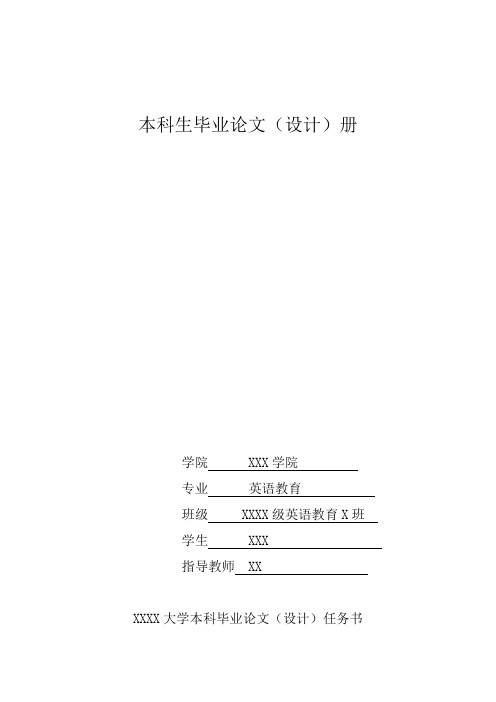
本科生毕业论文(设计)册学院 XXX学院专业英语教育班级 XXXX级英语教育X班学生 XXX指导教师 XX XXXX大学本科毕业论文(设计)任务书编号:论文(设计)题目:由《宠儿》分析美国黑人女性的悲惨命运及原因学院: XXX学院专业:英语教育班级: XXX英语教育X班学生姓名: XXX 学号: XXXX 指导教师: XX 职称:XX1、论文(设计)研究目标及主要任务本论文的研究目标是探讨美国黑人女性的悲惨命运。
其主要任务是通过分析美国飞人女性的悲惨命运来正视美国黑奴制给黑人女性带来的身心上的伤害,分析各方面原因,避免历史重演。
2、论文(设计)的主要内容本论文分为二章,第一章介绍美国黑人女性的悲惨命运,第二章介绍黑人悲惨命运的内部及外部原因。
3、论文(设计)的基础条件及研究路线本论文的基础条件是不同的外国语言文学研究者对《宠儿》中的女性的研究结果。
研究路线是对美国黑人女性的悲惨命运,她们的抗争以及造成她们悲惨命运的原因几方面进行分析,以期达到正视历史,警醒世人的作用。
4、主要参考文献1.Morrison Toni, Beloved (Penguin Putnam Inc.,375 HudsonStreet, New York, 1987 )2.陈洁奴隶制下扭曲的母爱——解读《宠儿》中的黑人母亲“塞丝”辽宁:辽宁工业大学学报 20093.黄锦莉奴隶制的血泪控诉——评介托尼.莫里森的《宠儿》中国图书评论4.潘岳,雷格《宠儿》中国文学出版社 1996教师:年月日教研室主任:年月注:一式三份,学院(系)、指导教师、学生各一份XXXX大学本科生毕业论文(设计)开题报告书XXX学院 XXXX 专业 XXXX 届XXXX大学本科生毕业论文(设计)评议书XXXX大学本科生毕业论文(设计)文献综述Literature ReviewIn the nine novels of African-American writer Toni Morrison, Beloved became the favorite of readers because of its thrilling plot and unparalleled narration. Toni Morrison was the first African American woman who was awarded the Nobel Prize for literature. The strong sense of tragic filled her novels from her beginning work The bluest eyes to her latest work A Mercy. In the book Conversations with Toni Morrison, 1 Toni Morrison was asked why her books always were so gloomy and so sad. Why didn’t she try to write some positive and healthy relationships? She answered that there was a writing style with happy marriage which was called comedy, but she would never write with it. She was writing something which can be called tragedy which can purify and enlighten. There was a huge difference between these two writing styles, but she tended to tragedy, may be because she was a minor classicalist.”In her eyes, the real life had the nature of tragedy. The present Americans, especially the black people, were and are fighting against their dilemma for a long time. This made her the first African American women to be cited for the prestigious award. She was a predominant writer of the 20th century in studying the black literature. As a female African American writer, Toni Morrison concerned seriously about the life and spiritual world of American blacks, especially the black women. In her fictional world, Toni Morrison reflected miseries, abnormalities and distortions of the black women’s feeling and mind under the oppressions of racism and sexism. Her remarkable achievements represented the recognition of a new kind of literature----the black women literature throughout the world. Toni’s education gave her the access to achieve the previous statement. She attended Howard University where she majored English with a minor in classics. Toni got her bachelor’s degree in English and then attended Cornell University and received a master’s degree in 1955. Toni’s early year s’experience and her knowledge of the history of her family and race made her feel more of the painful effects of racial discrimination. She was exposed to a lot of materials and writers that write about anti-slavery movements during her working time as an editor, which helped her produce an inspiration to figure out the terrible picture of slavery. Thus Beloved was born. And this inspiration was clearly expressed in the preface of Beloved. It was published in 1987 and made a literary sensation. It was considered as a milestone in the history of American literature. Morrison’s other works such as The Bluest Eye(1967), Sula(1973), Song of Solomon(1977), Tar Baby(1981), Paradise(1998), Love(2003), also received high praise in the American Literary World.African American literature, as an up-rising star of American literature, possessed a very important position in American literature. The vulnerable groups especially the African American females got a lot of attention from every aspect of the society.There emerged a large numberAfrican American literature. As an African American female writer, Toni Morrison paid much attention to the description of the psychological world of the African American people. Beloved was the fifth novel of Toni Morrison which was thought highly of. It was regarded as a milestone of American literature. Although it had become a controversial source since its publication, Beloved proved to be an extraordinary success and gained Morrison great reputation. Besides being awarded the Pulitzer Prize and the Nobel Prize, Beloved also won her the Robert F. Kennedy Award, the Melcher book Award and the Before Columbus American Book Award. The Elizabeth Cady Stanton Award from the National Organization for women also recognized the contribution the novel made to the history of black women. The American literary world had a high praise for this novel. Nation magazine valued it as Toni Morrison’s finest work and stated it belonged to the highest shelf of our literature. Chicago Sun-Time once valued Beloved as Morrison’s finest work and stated that nothing she had written so sets her apart, so displays her prodigious, almost shocking talents. Many critics were attracted to its controversial theme study. Elizabeth B. House says that, “Throughout Beloved, Morrison’s theme is that remembering yesterday, while not being consumed by them, gives people the tomorrows with which to make real lives.” "Beloved" was balance and thorough in structure. It had the system of modern mythology. The harsh emphasis on literary skills and the use of the stream of consciousness dominated the novel. After Morrison won the Nobel Prize for Literature, a lot of people, intentionally or unintentionally, dismissed her because of her identity. I thought that black women's identity is precisely the guarantee of her to get into the ranks of the masters of modern Western literature. It was her unique contribution to make the voice of the vulnerable groups (blacks and female) strongly imported into the Western literary tradition. Infanticide might be the most catching plot of the novel which stirred up thousands of studies on the analysis of Sethe’s psychology when she killed her daughter. Thousands of critics criticized this plot from different views. Li Xueqin and Lin Xiaoyong thought that Sethe’s behavior challenged the tradition conception of motherhood. Jane volt thought that Morrison praised Sethe’s determination and courage in sending her children to her mother-in-law, but at the same time, her making choice for her children led to her infanticide. Hu Ying and Li Mengru thought that the infanticide was the inevitable product of the history. Yang Xiaohui thought that Sethe’s behavior was her negative struggle against the slavery. And other scholars thought that Sethe’s behavior is the inevitable product of males’ domination of the world. Different people have different opinions about this plot. In my paper, I tend to regard Sethe’infanticide as her helpless accuse of the bloody and brutal slavery. And I tended to unearth the internal reasons of African American people which caused their miserable本科生毕业论文设计题目:由《宠儿》分析美国黑人女性的悲惨命运作者姓名: XXX指导教师: XX所在学院: XXX学院专业(系):英语教育班级(届): XXXX届完成日期 2013 年 5 月 14 日Analysis of the tragic fate of African American women and cause of it in BelovedBYXXXXPro.XXX , TutorA Thesis Submitted to Department of EnglishLanguage and Literature in PartialFulfillment of theRequirements for the Degree of B.A. in EnglishAt XXXXUniversityMay 14th, 2013内容摘要:非裔美国女作家托尼.莫里森的小说深刻的揭示了美国黑人女性在当时社会环境下的悲惨命运,其代表作《宠儿》是以黑人家庭三代女性的不同命运为题材来揭示黑人女性在当时的社会里所受到的各种压迫和悲惨的命运。
- 1、下载文档前请自行甄别文档内容的完整性,平台不提供额外的编辑、内容补充、找答案等附加服务。
- 2、"仅部分预览"的文档,不可在线预览部分如存在完整性等问题,可反馈申请退款(可完整预览的文档不适用该条件!)。
- 3、如文档侵犯您的权益,请联系客服反馈,我们会尽快为您处理(人工客服工作时间:9:00-18:30)。
南京晓庄学院本科生学士学位论文从芭芭拉·史密斯的黑人女性主义批评视角看《宠儿》的弑婴母题ON THE MOTIF OF INFANTICIDE IN BELOVED FROM PERSPECTIVE OF BARBARA SMITH’SBLACK FEMINIST CRITICISM所在院(系):行知学院学生:张林枫指导老师:陈永研究起止日期:2010年6月至2011年4月二○一一年四月Abstract and Key WordsAbstract:Beloved by Toni Morrison is taken as the best of Morrison’s works. Based on the real story of Margaret Garner, a black woman, Morrison has presented a full picture of the miserable situation ofthe black women under the oppression of slavery. The present thesis attempts to make a tentative study on infanticide from perspective of Babara Smith’s black feminism theory. It mainly analyzes Sethe’s infanticide and presents what prompts her to kill her baby. Sethe is constantly exposed to the traumas under the oppression of slavery, racism and sexism, and her infanticide indicates her self-consciousness and resistance to these oppressions.Key words: infanticide; black feminism; Sethe摘要:托尼·莫里森的《宠儿》被誉为莫里森的最杰出的著作。
小说的原型来源于玛格丽特·加纳,一个女黑奴的真实经历。
本文试图从芭芭拉史密斯的黑人女性主义理论角度探究这部小说的弑婴主题。
本文着重分析塞丝的弑婴经历,并剖析其原因。
在奴隶制、种族主义以及性别歧视三重压迫下,塞丝身心遭受巨大的折磨。
塞丝的弑婴意味着她的觉醒和反抗。
关键词:弑婴;黑人女性主义;塞丝CONTENTS1. Introduction.................................................................................... 错误!未定义书签。
1.1 Introduction to Beloved1.2 Introduction to Toni Morrison and Black Feminism1.3 Literature Review2. Analysis of Infanticide in Beloved from the Feminist Perspective 错误!未定义书签。
2.1 Sethe’s Suffering fr om Slavery, Racism and Sexism2.2 Sethe’s Awakening of Self-consciousness2.3 Sethe’s Infanticide3. Conclusion (6)Bibliography (7)Acknowledgements (8)On the Motif of Infanticide in Beloved from the Perspective of Barbara Smith’s Black Feminist Criticism1. Introduction1.1 Introduction to Beloved and Toni MorrisonBeloved presents the truths that even history sometimes fails to deliver. Morrison dedicates the novel to “Sixty Million and More” slaves and acknowledges the freedom that all the slaves yearned for (Therese, 2001). The publication of Belove d in 1987 shakes the American literary world, and is heralded as a milestone in American literary history.Set in the Reconstruction era (1870-90) after the Civil War and emancipation, the novel revolves around a child murder case committed by a desperate slave mother in Cincinnati, Ohio for protecting her daughter from the potential sufferings of slavery. It is inspired by a true story of Margaret Garner, an escaped slave from Kentucky who chose death for herself and her children rather than suffering from the misery and indignity of slavery. However, she succeeded only in killing one and the rest were recaptured and sold. Morrison transplants the true story into the novel and creates the mother infanticide Sethe, and the dead baby Beloved (Andrews, 1999). This novel penetrates deeply into the hearts of black women and reveals their agonies and distorted maternal love under the multiple oppressions of sexism, racism and class prejudices imposed on black women.Toni Morison is the first black female writer to win the Nobel Prize for Literature. She is hailed as a remarkable representative of black female writers. She believes that she is a “black woman novelist”, as she says, “As a black and a woman, I have access to a range of emotions and perceptions that were unavailable to p eople who were neither.” (Caldwell, 1994: 243)Throughout her life, Toni Morrison has contributed to the study and development of black and women literature. In addition to Beloved, she has written even more novels. As a matter of fact, Morrison’s novels are closely associated with two notions: “black” and “female”. Seven out of her eight novels are drawn from women’s unique experiences. In her writings, Morrison is dedicated to breaking the stereotyped black female figures portrayed in the canon of American literature,vividly creates a wide range of new images of black women, and presents the black women’s subjectivity. Besides, Morrison is also engaged in the description of black men and their relationship with women. Morrison’s great concern over the i ssues of black men exerts profound influence on other black women writers and stimulates the shift of the focus in black feminist criticism. Toni Morrison clearlyknows her responsibility as an American black woman writer. She takes presenting the American social realities and destinies of common Americans as her major tasks. In Toni Morrison’s works, it is easy to perceive her sensitive insight, elegant language, talented writing and her honesty and outspokenness, with which she is able to reexamine the bl ack people’s experiences, especially the black women’s struggling against sexism, racism and classism.1.2 Introduction to Black FeminismBlack feminism is deep-rooted in the struggles of black women for generations. The introduction of black feminism into literature is of great importance. Among the black feminism critics, Barbara Smith is a forerunner. In her landmark essay “Toward a Black Feminist Criticism” published in 1977, Barbara Smith names black feminist criticism and explicitly states the three points: first, feminist criticism must recognize the long literary history of black women because “black women writers constitute an identifiable literary tradition which parallels the tradition of Black men and white women”.(Showalter, 1985:174) Second, black feminist critics should “look first for precedents and insights in interpretation within works of other Black women.” (Showalter, 1985:175) Third, the politics of sex and the politics of race and gender are critically interlocked in the writings of Black women writers. Beloved reveals Barbara Smith’s two basic principles that black feminist criticism is expected to follow. Morrison agrees with the notion that “the politics of sex as well as the politics of race and class are crucially interlocking fac tors” (Showalter, 1985:170). Therefore, she makes an intensive analysis of how complexities of class, race, and sex affect black women and the whole Afro-American ethnic group.1.3 Literature ReviewEver since its publication, Beloved has drawn attention from critics and scholars, who attempt to interpret it from as many different perspectives as possible.Some critics take the novel as an expression of ideology. Some critics focus on mothering and motherhood. To Margaret Atwood, the focus is on Sethe. Beloved should be interpreted as a tale of thick maternal love seeking for an ultimate way out for liberation of the black women. Jan Furman takes the novel as a song for Sethe’s maternal love and sacrifice. Stephanie A. Demetrakopoulous explores how slav ery denies Sethe’s maternal love and twists it into a terrible infanticide. Ashraf H. A. Rushdy, based on Sigmund Freud’s theory, analyzes the characters from perspective of psychology. Feminists attempt to interpret the novel from a feminist perspective b y analyzing the nature of woman slave’s oppression (Tian Wei, 2008).In China, the critical studies of Beloved mainly focus on the analysis of the novel’s narrative characteristics, theme, mother-daughter relationship,symbolism and imagery.Zhao Na (2006) interprets the main characters in the novel and how they suffer from the traumas based on Freud’s psychological theory. She concludes in her MA thesis, based on history, represents the history of the black’s being oppressed and seeking for identity. Hao Xianfeng (2010) explores the hardships that Sethe experiences in the journey of gaining freedom and liberation. According to Hao, it is the genuine love that overthrows the cruel slavery. Zhao Yan (2010) explores the employment of symbolism in the novel. He points out that the employment of symbolism plays an important role in presenting human beings’ mentality, promoting the development of plot, deepening the theme of the novel and expanding the readers’ imagination.The findings of critics indicate that Beloved is loaded with implications. Although these studies have touched upon infanticide, no intensive study has been made on the topic from the feminist perspective. The introduction of feminist criticism into literature actually provides us with a totally new perspective to interpret the novel.2. Analysis of Infanticide in Beloved from the Feminist PerspectiveThe woman protagonist, Sethe, is a typical American black woman slave in a society controlled by slavery. She constantly rebels against the traditional mold imposed on black women and explores freedom and independence. Therefore, she stands far apart from other Negroes. Despite her resolution and boldness, Sethe leads an unhappy life as she is haunted by the past experience of infanticide.2.1 Sethe’s Suffering from Slavery, Racism and SexismSlavery, racism and sexism are the common themes in black literature. In Beloved, Morrison explores the issues through portraying a series of female characters. Description of Sethe best manifests the themes. Sethe lives under the triple oppressions of slavery, racism and sexism.The formation of slavery is based on the notion that slaves are the legal property of slave owners, which indicates that the slaves are not treated as human beings but objects. Under the slavery system, black women are suffering from the poor economic conditions;thus, they have to work outside their homes, which makes it hardly possible for them to offer proper care to their children. The slavery system not only erodes the black physically, but also destroys them spiritually. Slavery fetters them in that the slaves cannot lift themselves out of their miserable life. In Beloved, Sethe, as a capable black woman and mother, is suffering from loss of motherhood under slavery. She cannot protect her children from being persecuted by slavery in a normal way.Thus, she unwillingly kills her daughter. When the ghost of the killed baby returns, Sethe feels obliged to provide Beloved, whether her daughter or not, “a bed to sleep in and som ebody there not worrying you to death about what you gotto do each day to deserve it” (Morrison, 2000: 67- 68). The slavery once leads to the loss if motherhood, as Kubitschek notes, “On the plantations...black women’s nurturance—from the physical (nursing milk) to the metaphysical (energy and patience)—is used up primarily in working fields and tending white children” (1998:166). Therefore, when the ghost returns, Sethe has her responsibility as a mother. But for Sethe, who was able to have her children w ith her, “the major means of protecting children from slavery is to value them” (Kubitschek, 1998: 166). All in all, slave women are worthless unless they have the capacity of producing children like animals.Persecuted by racism, Africans were forced to abandon their African language and culture. Instead, they were forced to accept a new language and culture of whites. In Beloved, Morrison displays the picture of Sethe’s childhood in a manner similar to montage. In the picture, Black men and women sing songs and dance. Sethe recalls her childhood back in Africa. “sometimes they danced the antelope. The men as well as the ma’ams, one of whom was certainly her own. They shifted shapes and became something other. Some unchained, demanding others whose feet knew her pulse better than she did” (Morrison, 2000: 31). When she is at early age, Sethe could understand the language, but several years later she cannot remember or recall her native language. The imposition of language and culture displays how deliberately a ruling group of white people maintains a social hierarchy to retain their own privileges, to exploit black people and to ultimately put them at the maximum disadvantage.Besides, sexism is another shackle imposed on the black woman. The black women are taken as a “natural thing” to provide labor and to give birth to new laborers. Their basic emotion of love is suppressed and ignored, and they are even deprived of the right to be a wife and woman. “Slaves not supposed to have pleasure feelings on their own; their bodies not supposed to be like that, but they have to have as many children as they can to please whoever owned them” (Morrison, 2000: 209). Sethe comes to Sweet Home simply because Baby Sugg is too old to work For Sethe, she is deprived of the maternal love. She has a vague memory of her mother. Nor does Sethe can remember what language her mother speaks. Besides, Sethe suffers from loss of names. Naming is a critical means of keeping track of identity, place of origin and family bloodline. In an interview with Thomas LeClair (1994), Morrison states the significance of names and naming: “If you come from Africa, your name is gone. It is particularly problematic because it is not just your name but your family, your tribe. When you die, how can y ou connect with your ancestors if you have lost your name? That’s a huge psychological scar” (cited in Peach, 1998: 57). Sethe has no idea of what her original American name is. As a result, she suffers from a serious identity crisis and the distorted mentality. As a salve woman, she has nothing. Sethe is nothing but a subhuman. She once believes that she has “animal characteristics.”2.2 Sethe’s Awakening of Self-consciousnessSethe is a victim to slavery. Living in a society rampant with racism and sexual discrimination, she is forced to lose the self-hood but accept the existing social order and patriarchal ideas. As Sethe was born to a slave mother, she is doomed to have the doomed identity---a slave. The deprivation of her mother’s love makes Sethe completely live in a world with shackles. It is impossible for a black child like Sethe to gain self-identity.Seth lives in Sweet Home, where the owner Mr. Garner claims that he treats his slaves as human beings. The men of Sweet Home have the rights of “buy [ing] a mother, choose a horse or a wife, handle guns, even learn reading if they wanted to” (Morrison 125), they were allowed to do so only as Garners’ property and within th e bounds of his property. During the time when Mr. Garner is in charge of the Sweet Home, Sethe has the fantasy for something unrealistic-living as the precocious child of benevolent white parents has. When Halle asks her to be his wife, Sethe happily agrees and then at a loss as to what to do next. Therefore, she turns to Mrs. Garner for help as she regards. Mrs. Garner as her loving parent. When Mr. Garner’s brother-in-law, the schoolteacher, takes over Sweet Home after Mr. Garner’s death, Sweet Home chan ges to a horrible black slave community. Schoolteacher attempts to instill into the pupils’ minds that the black are properties and animals. The school teacher’s teaching wakens Sethe, who gains the strength to plan an escape. Early, Sethe and other slaves plan to escape under the guidance of two men, because “only Sixo, who has been stealing away to see his woman, and Halle, who has been hired away for years, know what lies outside Sweet Home and how to get there (Morrison, 2000: 223).” However, their plan fails. Without men’s help and guidance, the six-month pregnant Sethe manages her harsh escape owing to her strong desire for life and freedom. “I did it. 1 got us all out. Without Halle too. Up till then it was the only thing I ever did on my own. Decided. And it came off right, like it was supposed to…” (Morrison, 2000: 162).The journey of escape indicates Sethe’s awakening of self-consciousness. Having been persecuted for a long period of time, Sethe is finally awakened that she should bravely struggle for freedom and identity. Sethe’s successful escape is kindled by her strong desire for maternal right and the bright future of her children. For the first time, she comes to realize that it is important to reclaim for maternal love and self-identity by freeing her from the slavery oppression.2.3 Sethe’s InfanticideThe event of infanticide runs throughout the novel. What is noteworthy is that the white people have nothing to do with the death of the baby, but that it is caused by the black and by the baby’s mother, a black woman. The elaboration on the infanticide helps reveal the forceful destruction that slavery has brought about to the black people both physically and spiritually.Sethe’s struggle for identity is highlighted when she kills her baby. When her milk for the baby is taken away, she decides to send her children away to construct the new identity for herself and herchildren as well.To protect her children from the cruel slavery, she courageously ends their lives. She will never allow her children to be persecuted by slavery and sexism. “And though she and the others lived through and got over it, she could never let it happen to her own. The best thing she was, was her children. Whites might dirty her all right, but not her best thing, her beautiful, magical best thing-the part of her that was clean.” (Morrison, 2000:251) She herself has suffered from the loss of her own mother and deprivation of the maternal love. Therefore, she knows well that her children would never belong to her as she is a slave mother. However, as a free woman, she believes that she has the right to love her children, so Sethe tries to “hurt the hurter” (Morrison, 2000:234) in the form of a handsaw. It is morally wrong. However, she should not be blamed for the deed. As a slave mother, she has no choice. The black women’s killing their infants can be justified when we take an in-depth look into what Elizabeth Fox-Genovese explains. For Elizabeth Fox-Genovese, children are the properties of their owners;thus, some slave women hold that “by killing an infant they loved, they would be in some wav reclaiming it as their own” (Fox-Genovese, 1998: 324). Infanticide is cruel, an action that human beings are ashamed of. However, it is the most consummate way to resist the notorious slavery in the most helpless situation. This extreme behavior to resist slavery clearly reveals she has realized that self-identity is inviolable. However, after an eighteen-year reflection on infanticide, Sethe gradually realizes that it is better to find an active way to protect children and her dignity as a human being.Infanticide is immoral and kind of crime. By presenting the miserable experiences of a slave mother, Morrison intends to arouse sympathy for Sethe. However, Morrison does not advocate infanticide as the act runs counter to the traditional African principle of survival. In Morrison’s mind, infanticide is “absolutely the right thing to do ...but also the thing you have no right to do” (Peach, 1998: 17). By describing Sethe, Morrison demonstrates the racial oppression poses threat to the humanity of both the oppressors and the oppressed.3. ConclusionToni Morrison, as the first black woman writer to win the Nobel Prize for Literature, makes immeasurable contributions to the contemporary literature, especially black women literature. The present thesis has made a tentative study on Sethe’s infanticide in her novel Beloved from the feminist perspective. Sethe is constantly exposed to the traumas as a result of slavery, racism and sexism, and her infanticide indicates her self-consciousness and resistance to the oppressions. The vivid portrait of Sethe makes Beloved become the manifesto of black feminism. Although Morrison breaks the stereotyped mother images---- all-nurturing, caring and devoted Great Mothers, the mother image represented by Sethe is more real. Although Sethe immorally kills her baby, she does that for helping her children gain freedom. It is expected that this study has contributed to Feminist studies and African A merican studies,and will help deepen readers’ understanding of the female protagonist in the novel.Bibliography[1] Andrews, William L.& Nellie Y Mckay. Toni Morrison’s Beloved: A Casebook [M]. New York: Oxford UniversityPress. 1999.[2] Caldwell, Gail. Author Toni Morrison Discusses Her Latest Novel Beloved [A], in Dandle Peach, [3] Fox-Genovese,Elizabeth. Within the Plantation Household [M]. Chapel Hill: University of North Carolina Press,1988.[4] Linden. Toni Morrison [M]. Palgrave Macmillan, 1998.[5] Morrison, Toni. Beloved [M]. Beijing: Foreign Language Teaching and Research Press, 2000.[6] Kubitschek, Missy Gehn. Toni Morrison: a Critical Companion[M]. Westport, Connecticut: Greenwood Press,1998.[7] Showalter, Elaine, eds. The New Feminist Criticism: Essays on Women, Literature, and Theory[M]. New York:Random House, 1985.[8]Taylor-Guthrie (eds) Conversation with Toni Morrison [C]. Jackson: University Press of Mississippi, 1994.[9] Therese, E. Higgins. Studies in African American History [M]. New York: Routledge, 2001.[10] 郝险峰. 《宠儿》黑人农奴制最后的复仇与解体[J]. 长城.2010 (6).[11] 田巍. 破茧重生—对《宠儿》的女性哥特解读[D]. 华北电力大学硕士学位论文, 2008.[12] 赵娜. 伤痛与愈合: 托尼莫里森小说《宠儿》中癔症的精神分析研究[D]. 西北大学硕士学位论文, 2006.[13] 赵燕. 《宠儿》中象征意蕴的多重解读[J]. 考试周刊, 2010 (43).。
